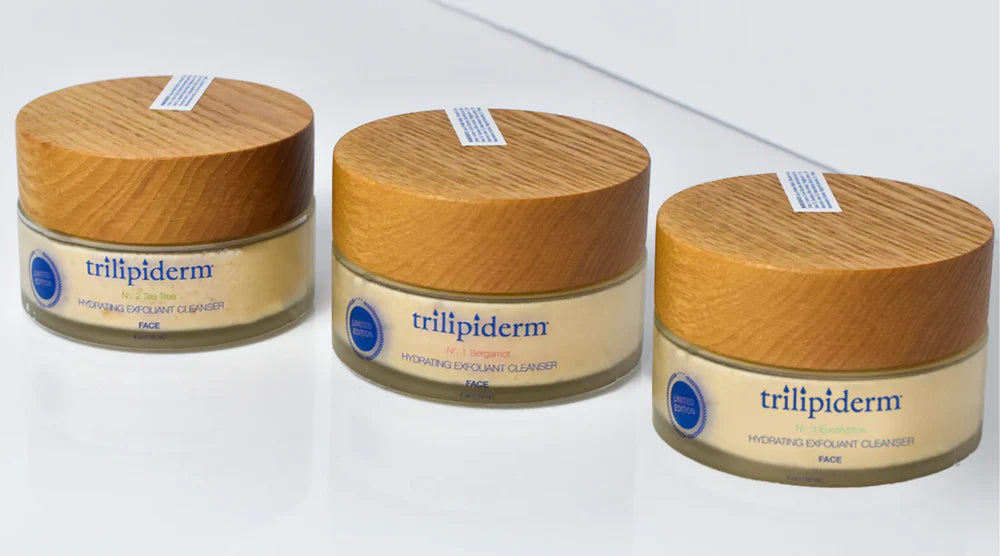Does SPF 30 protect you? Today's blog dives into how well SPF 30 guards against harmful UVB rays and its effectiveness in different settings. You'll find answers to questions like whether SPF 30 can handle a day at the beach, how long it lasts, and if it's suitable for oily or acne-prone skin. We also compare SPF 30 with higher ratings like SPF 50 and 70 to give you a clear view of what you need for maximum sun safety.
Speaking of sunscreens, at Trilipiderm we've found the best pick for daily defense: our Protective Day Crème Broad Spectrum SPF 30. It's not just about protection; this crème also offers additional skincare benefits, making it a top choice for SPF skin moisturizers for anyone looking to guard their skin effectively.
Does SPF 30 Protect You?
Let's cut to the chase: does SPF 30 protect you? Yes, SPF 30 does offer substantial protection against the sun's UVB rays, which are primarily responsible for sunburn and can contribute to skin cancer.
SPF, or Sun Protection Factor, measures the fraction of sunburn-producing UV rays that reach the skin. For example, SPF 30 means that 1/30th of the burning radiation will reach the skin, assuming sunscreen is applied evenly and in sufficient quantity.
SPF 30 blocks about 97% of UVB rays. This level of protection is generally considered sufficient for everyday activities with occasional sun exposure. However, no sunscreen can block 100% of UV rays, and any SPF 30 is no exception.
SPF 30 Duration and Effectiveness
Does SPF 30 protect you and how long does it last? Typically, SPF 30 sunscreen provides effective protection for up to two hours. It should be reapplied every two hours or immediately after swimming, sweating, or towel drying to maintain its protective barrier against UVB rays.
Is SPF 30 Enough for Acne?
SPF 30 is generally suitable for acne-prone skin, provided the sunscreen is non-comedogenic, meaning it won't clog pores. It's important to choose formulas that are oil-free and labeled as suitable for the face and sensitive skin to avoid exacerbating acne.
Is SPF 30 Good for Oily Skin?
For oily skin, SPF 30 can be effective if the right formula is chosen. Look for sunscreens labeled as oil-free and non-comedogenic. These are designed to provide sun protection without adding extra oil to the skin, which can prevent breakouts and keep the skin looking matte.
Is SPF 30 Enough for a Beach?
While SPF 30 can be enough for short beach visits, it may not offer sufficient protection for extended exposure during peak sun hours. For long days at the beach, a higher SPF and water-resistant formula is recommended. It's crucial to reapply sunscreen after swimming or sweating to maintain protection.
Effective SPF 30 Application Guide
Proper application of SPF 30 sunscreen is crucial for maximum protection against harmful UV rays. This guide will detail how to apply it correctly and clarify common questions about daily usage and nighttime needs.
How to Properly Apply SPF 30
- Choose the Right Formula: Pick a broad-spectrum SPF 30 sunscreen that suits your skin type—whether it's for sensitive, oily, or dry skin.
- Apply Generously: Use about a shot glass-sized amount (two tablespoons) of sunscreen to cover your body and a nickel-sized dollop for the face. This ensures adequate coverage.
- Timing Is Key: Apply sunscreen 15 to 30 minutes before you go outside. This allows it time to absorb into the skin and start protecting you as soon as you step outdoors.
- Don't Miss Spots: Be thorough. Cover all exposed areas, including ears, back of the neck, and tops of feet. Use a lip balm with SPF on your lips.
- Reapply Regularly: Sunscreen wears off. Reapply every two hours, or more often if you are swimming or sweating. This is vital to maintain protection throughout the day.
Can You Use SPF 30 Everyday?
Yes, daily application of SPF 30 is recommended for all skin types. Daily use protects against cumulative sun damage that can lead to skin cancer and premature aging.
Is Nighttime Application Necessary?
No need to apply sunscreen at night. Sunscreen is designed to protect against UV rays, which are not present once the sun goes down.
Best Times to Apply
Sunscreen is most needed during daylight hours, especially between 10 AM and 4 PM, when UV rays are strongest. Even on cloudy days, up to 80% of UV radiation can penetrate the clouds, so applying SPF 30 is still necessary.
By following these guidelines, you ensure that SPF 30 sunscreen provides effective protection against the sun's harmful effects, helping maintain healthy skin year-round.
SPF 30 vs 50 vs 70
If SPF 30 isn't enough for extended time at the beach, which SPF should you use? Let's explore the differences between SPF 30, 50, and 70 to help you decide the best sun protection for your needs.
SPF 30
Does SPF 30 protect you? Well, SPF 30 blocks about 97% of UVB rays. Thus, it is effective for daily use, such as short outdoor walks or errands. Reapplication every two hours is vital, especially if you are sweating or swimming. SPF 30 is a common choice for individuals with darker skin tones who may not burn as quickly but still need protection from UV radiation.
SPF 50
SPF 50 offers enhanced protection by blocking approximately 98% of UVB rays. This makes it a preferred option for longer outdoor activities under higher sun exposure. SPF 50 is often recommended for fair-skinned individuals who burn easily. Like SPF 30, it requires reapplication every two hours and immediately after water activities or heavy sweating.
SPF 70
SPF 70 blocks about 98.5% of UVB rays, providing even stronger protection. It is especially useful for very fair skin, high-altitude environments, or tropical locations where the sun's radiation is most intense. Despite its higher protection level, SPF 70 also needs to be reapplied frequently to maintain its effectiveness throughout the day.
In conclusion, choosing between SPF 30, 50, and 70 depends on your skin type, the intensity of sun exposure, and the duration of your time outdoors.
Higher SPF levels offer more protection and might be better suited for situations where you face prolonged exposure to strong sunlight. No matter the SPF, proper and consistent application is key to safeguarding your skin effectively.
Understanding SPF Ratings with PA+++
Is it safe to use sunscreen labeled with "PA+++"? Absolutely. The PA rating system indicates the level of protection from UVA rays, which are responsible for skin aging and long-term damage. PA+++ represents a high level of UVA protection, which is important alongside SPF that mainly blocks UVB rays, the primary cause of sunburn.
Sunscreen with a PA+++ rating provides a more comprehensive defense against the broader spectrum of ultraviolet radiation. This makes it especially valuable for those who spend significant time outdoors or in areas with strong sunlight. Using a sunscreen that features both SPF and PA+++ ensures you cover both bases: protecting against both burning and aging.
Products with this rating are tested to ensure they offer more than just basic protection. They help in preventing the deep-set damage that UVA rays can cause, which often leads to premature aging and increases the risk of skin cancer. By choosing a product with PA+++ and a suitable SPF level, you equip your skin with a robust shield, making these sunscreens safe and highly recommended for daily use to maintain healthy skin.
Discover SPF 30 with Trilipiderm
Do you need SPF 30? Let Trilipiderm show you why it's essential and why we stand out as the best choice for your skin care needs.
Trilipiderm's Protective Day Crème Broad Spectrum SPF 30
Trilipiderm's Protective Day Crème is a favorite among skincare experts. Its formula is fragrance-free, making it perfect for sensitive skin types. Not only does it protect your skin from harmful UVA and UVB rays with SPF 30, but it's also a 3-in-1 solution for moisturizing, skin restoration, and sun protection.
The crème is enriched with hyaluronic acid, which effectively plumps the skin and reduces the appearance of fine lines. It contains powerful plant-based ingredients that naturally nourish and restore your skin.
Additionally, it boosts collagen production, enhances skin elasticity, and provides antioxidant protection against environmental stressors. This product is suitable for wearing under makeup or alone as part of your daily skincare routine.
Trilipiderm's All-Body Moisture Retention Crème Broad Spectrum SPF 30
Our All-Body Moisture Retention Crème offers deep hydration alongside SPF 30 protection, all in one product. It is packed with Vitamin D and omega fatty acids for deep nourishment and plant-based lipids that maintain your skin's protective barrier.
These ingredients mimic the natural structure of your skin cells, ensuring optimal hydration and protection throughout the day. This multifunctional crème not only protects your skin from the sun but also promotes skin-cell turnover for rejuvenation and smoother, softer skin.
Both products are dermatologist and pharmacist-recommended, gluten-free, cruelty-free, and vegan, catering to a wide range of ethical and dietary preferences.
With options for every part of your body, Trilipiderm ensures your skin is protected, nourished, and restored wherever you go.

